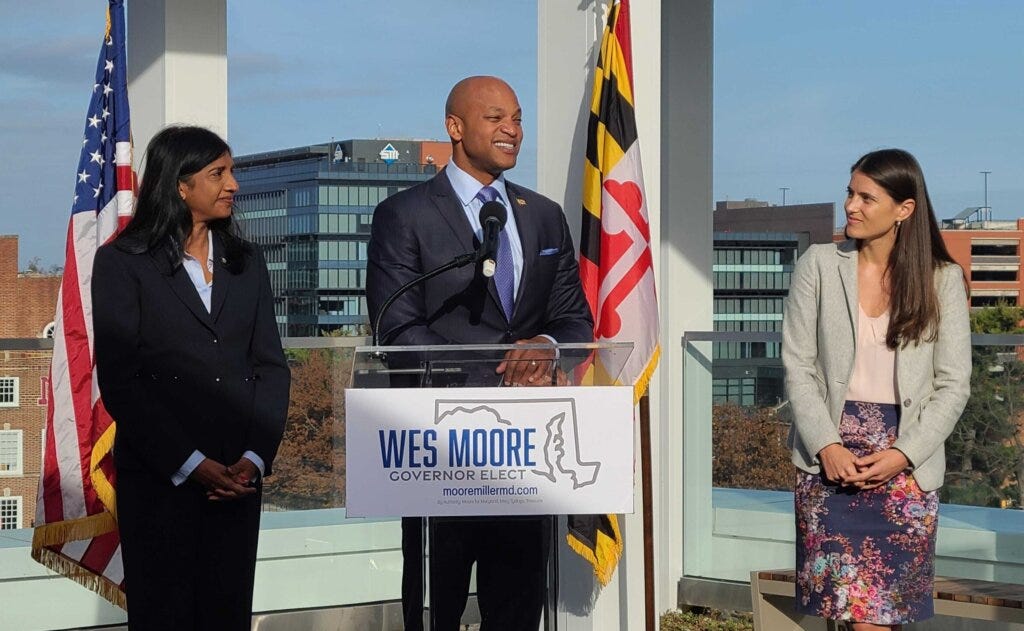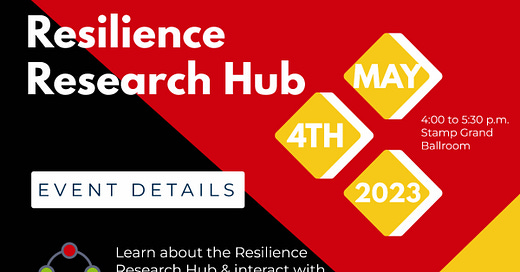the growing importance of democratic resilience
CDCE is joining with colleagues to participate in the BSOS Resilience Research Hub Showcase. Together we are learning how to recognize and cultivate democratic resilience in our communities.
Dear Friends,
At the UMD Center for Democracy and Civic Engagement, we are always working to bring community partners together with faculty and students at UMD to learn together about how to strengthen democracy.
Our partners are always working in uncertain environments. Weather related disasters and public health crises disrupt democratic processes and long planned election administration efforts. Unexpected political forces undermine trust in democracy and create new challenges for the leaders of civic institutions. In recent years, particularly in the 2020 election, many of these challenges converged at once.
Last year, we expanded our work on democratic resilience at CDCE by publishing an important literature review by GVPT PhD Student Amy Meli about “when action planning for 100% voting works.” Amy’s work challenges us to think about the choices we make every day - especially when we are not confronted with a new crisis or challenge - that make civic engagement efforts more effective and resilient. These insights about how communities can design resilience into their plans for civic engagement are essential for our community partners when developing strategy and policy in an increasingly uncertain world.
Building on Amy’s great work, I am thrilled to share several ways you can get involved with our work cultivating democratic resilience at CDCE this year.
1. Join us and BSOS Dean Susan Rivera May 4 for the Resilience Research Hub Showcase
At CDCE, we are proud to be a part of the College of Behavioral and Social Sciences at the University of Maryland (BSOS). BSOS is essential to our success as a Center. When we want to study the intersection of voting and the criminal legal system, we are able to do that in partnership with the best criminology program in the country. When our work would benefit from the expertise of top scholars in African American Studies or Sociology or Economics or Psychology or any of the 10 (!!) departments that make up our college, that knowledge is just down the hall.
We are very excited to be joining with these colleagues to participate in the BSOS Resilience Research Hub Showcase this week. When we want to understand the psychology of how election administrators respond to the stress of running an election in a pandemic, this hub is a space where we can get those answers. When others in our college want to understand the civic implications of climate resilience policy, our Center is there to help.
We hope you’ll join us for the Research Showcase from 4 pm - 5:30 pm at the Stamp Grand Ballroom on the UMD campus! You can RSVP here. All are welcome.
2. Exploring New Research in “Election Resilience”

The Atlantic Hurricane season runs from June to November. It overlaps with Federal General Elections every other year. In 1992, Hurricane Andrew hit Florida in August and the National Guard ended up helping to administer the Presidential election in many parts of the state. In 2012, Hurricane Sandy made landfall just days before the Presidential election, disrupting voting in many states. Many other elections have been disrupted by weather related disasters and other “shocks” in recent decades.
It’s not just hurricanes. The Loma Prieta earthquake hit San Francisco just weeks before a municipal election and September 11, 2001 was Primary Election Day in the New York City Mayoral Race. We all are familiar with the many ways in which the COVID-19 Pandemic dramatically impacted the ways we voted in 2020. CDCE contributed to our understanding through a series of surveys with the Washington Post, research on voting at sports stadiums, research on attitudes toward voting methods, and research on policy changes in U.S. states. Climate change increases the chance elections will be disrupted not only by hurricanes but other weather related disasters like wildfires and flash flooding.
Shocks like these are not outlier events in our democracy. They are normal. In any given national election, it’s likely that there will be a substantial disruption somewhere. And some disasters, like COVID-19, can affect the whole country at once. There is an urgent need for more rigorous research on “election resilience” - the ability of election administrators and communities to adapt in the face of disruptions.

At CDCE, we are thrilled to be working with our colleagues at the Center for Disaster Resilience in the UMD Clark School of Engineering to develop this line of inquiry. How can we model and predict which areas are most likely to have their elections disrupted? What policy responses can make our election administration systems more resilient to these shocks? What research protocols can we put in place to make sure scholars are able to learn about election resilience when an election is disrupted unexpectedly?
This is such an exciting research area! Please reach out to me if you’re interested in getting involved with this research or learning more about election resilience.
3. Stewarding Resilience Through Effective Government Transitions

Government transitions are an overlooked area in political science. But the period after elections is just as important as the much remarked upon period before elections. Executive transitions between two Presidents or Governors or Mayors or County Executives are critical moments for our democracy. These are moments when faith in the peaceful transition of power and trust in election results can be strengthened or weakened. For government executives, transitions are times when huge numbers of key hires must be made quickly so that elected officials are ready to govern on day 1. In Maryland, a Governor must deliver a full state budget - a $63.1 billion spending plan in 2023 - to the legislature during their first week in office. Government transitions are key moments for resilience where governments have the opportunity to adapt to changing circumstances and challenges.
Transitions don’t only matter for newly elected officials. They also matter for the public. Right before an election, the public is induced to think about public issues through the lens of the pre-ordained mutually exclusive choices on their ballots. During transitions, however, newly elected officials are able to engage the public in a more open-ended way to explore different pathways and partnerships to achieve shared priorities. Government transitions are significant moments when the public can be mobilized to serve in government and engage in community problem solving. There is huge potential to use transitions to cultivate a broader “democratic imagination” in our society.
At CDCE, we’re learning more about the power of government transitions through the Effective Government Transitions Project we launched last fall. We’ve been curating and publishing historic transition documents from around the state, learning from veterans of transitions both here in Maryland and around the country, and building templates that future elected officials can use in the days after winning an election. These tools and resources will help leaders take advantage of the precious moments between Election Day and Inauguration Day to strengthen democracy.
The Upshot? The work of cultivating democratic resilience needs all of us.
Our democracy needs to be resilient in the face of so many interconnected challenges. At CDCE, we are called to the work of mobilizing the entire UMD community to strengthen democracy. This year, it has been such a privilege to work with so many inspiring colleagues from across BSOS, UMD, and the broader community to figure out how to cultivate democratic resilience. I hope you’ll join us at the Resilience Hub Research Showcase this Thursday, get involved with one of our existing projects, or suggest a new partnership. All of us - including you - are needed to cultivate lasting democratic resilience in our state and nation.
Sincerely,
Mike Hanmer
Professor, Government and Politics
Director, Center for Democracy and Civic Engagement
Department of Government and Politics
College of Behavioral and Social Sciences, University of Maryland



